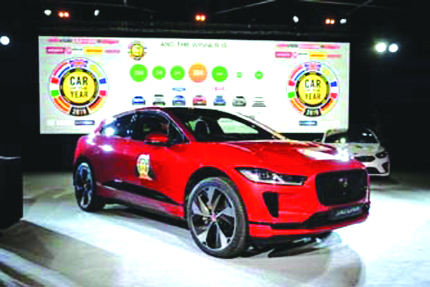
AFP, London :
Car manufacturer Jaguar Land Rover has decided to produce a range of electric vehicles at its central England factory, it announced Friday, securing thousands of jobs in a major boost to post-Brexit Britain.
“Jaguar Land Rover today revealed plans to manufacture a range of new electrified vehicles at its manufacturing plant in Castle Bromwich, UK,” the Indian-owned group said in a statement.
The first car to roll off the production line at Castle Bromwich, which currently employs 2,500 workers, will be the next-generation all-electric Jaguar XJ luxury saloon model.
“It’s a huge step for (the) very prestigious, special premium-luxury XJ production in Castle Bromwich,” JLR Chief Executive Ralf Speth told AFP in an interview.
The facility in Birmingham, Britain’s second biggest city, will produce the electric vehicles as part of a “huge” electrification investment that was “in the billions”, Speth said.
The news is a welcome fillip for the nation’s largely foreign-owned car sector, which has long warned over the impact of Britain’s looming departure from the European Union at the end of October. Batteries will be made in neighbouring Hams Hall, Warwickshire, while electric motors will be manufactured at JLR’s engine plant close to the nearby city of Wolverhampton.
“Today’s announcement, which safeguards several thousand jobs in the UK, is the next stage in execution of Jaguar Land Rover’s electrification strategy,” JLR added.
The group aims to offer electrified options for all new Jaguar and Land Rover models by 2020.
“The future of mobility is electric and as a visionary British company, we are committed to making our next generation of zero-emission vehicles in the UK,” added Speth.
The investment, praised as “trailblazing” by Britain’s biggest trade union Unite, follows an agreement for employees to work a four-day week as part of restructuring plans.
“This is a proud day for our members and Jaguar Land Rover,” said Steve Turner, Unite assistant general secretary for manufacturing.
Cardiff University professor Peter Wells cautioned that Brexit was probably not a major factor in JLR’s decision, given its existing UK manufacturing operations and declining consumer demand for high-polluting diesel cars.
“The company is constrained by what they’ve got… it’s not really a Brexit-related decision,” Wells told AFP.
“It’s more an issue that has been forced upon the company, perhaps faster than they had wanted.
“The market is changing across the world quicker than many car companies have anticipated, so in that respect the company was essentially forced to invest in the UK – even though it’s not perhaps ideal in terms of reaching those key European markets.”
Britain’s auto sector warned last week that a no-deal Brexit could cost UK-based carmakers up to o70 million ($89 million, 78 million euros) daily through delays to production.
JLR, which launched its first electric vehicle I-PACE last year, is meanwhile late to develop its strategy for the segment.
Car manufacturer Jaguar Land Rover has decided to produce a range of electric vehicles at its central England factory, it announced Friday, securing thousands of jobs in a major boost to post-Brexit Britain.
“Jaguar Land Rover today revealed plans to manufacture a range of new electrified vehicles at its manufacturing plant in Castle Bromwich, UK,” the Indian-owned group said in a statement.
The first car to roll off the production line at Castle Bromwich, which currently employs 2,500 workers, will be the next-generation all-electric Jaguar XJ luxury saloon model.
“It’s a huge step for (the) very prestigious, special premium-luxury XJ production in Castle Bromwich,” JLR Chief Executive Ralf Speth told AFP in an interview.
The facility in Birmingham, Britain’s second biggest city, will produce the electric vehicles as part of a “huge” electrification investment that was “in the billions”, Speth said.
The news is a welcome fillip for the nation’s largely foreign-owned car sector, which has long warned over the impact of Britain’s looming departure from the European Union at the end of October. Batteries will be made in neighbouring Hams Hall, Warwickshire, while electric motors will be manufactured at JLR’s engine plant close to the nearby city of Wolverhampton.
“Today’s announcement, which safeguards several thousand jobs in the UK, is the next stage in execution of Jaguar Land Rover’s electrification strategy,” JLR added.
The group aims to offer electrified options for all new Jaguar and Land Rover models by 2020.
“The future of mobility is electric and as a visionary British company, we are committed to making our next generation of zero-emission vehicles in the UK,” added Speth.
The investment, praised as “trailblazing” by Britain’s biggest trade union Unite, follows an agreement for employees to work a four-day week as part of restructuring plans.
“This is a proud day for our members and Jaguar Land Rover,” said Steve Turner, Unite assistant general secretary for manufacturing.
Cardiff University professor Peter Wells cautioned that Brexit was probably not a major factor in JLR’s decision, given its existing UK manufacturing operations and declining consumer demand for high-polluting diesel cars.
“The company is constrained by what they’ve got… it’s not really a Brexit-related decision,” Wells told AFP.
“It’s more an issue that has been forced upon the company, perhaps faster than they had wanted.
“The market is changing across the world quicker than many car companies have anticipated, so in that respect the company was essentially forced to invest in the UK – even though it’s not perhaps ideal in terms of reaching those key European markets.”
Britain’s auto sector warned last week that a no-deal Brexit could cost UK-based carmakers up to o70 million ($89 million, 78 million euros) daily through delays to production.
JLR, which launched its first electric vehicle I-PACE last year, is meanwhile late to develop its strategy for the segment.

